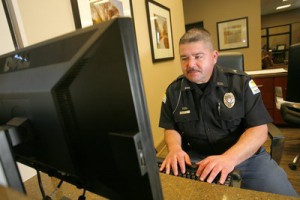**This article first appeared in the March/April edition of Police & Security News and has been reposted with permission.**
By Leischen Stelter
Law enforcement officers (LEOs) often ask whether or not they need a formal degree. The immediate benefits of a degree depend partially on your agency. Some agencies provide financial incentives and will pay for part of your education, while others may provide a yearly bonus for those with a degree. Some agencies have a minimum education requirement for hiring or promotion.
Chief Joel Hurliman has spent his 37-year police career with the Shelton Police Department in Connecticut and has been the chief since 2006. His department does not have an education requirement, but candidates with a four-year degree are often preferred. “Studies have found that officers who have achieved a four-year degree have lower discipline rates statistically,” Hurliman said.

Hurliman puts a lot of weight on education, personally and professionally. He holds two master’s degrees and strongly encourages his officers to further their own education. In total, 24 of his 50 officers have a degree, with several others working towards it.
One of the greatest advantages of having educated officers is that they often have very strong writing skills. “Writing reports is a basic part of the job and it goes all the way to the top,” Hurliman said. He added that a degree also demonstrates self-discipline and a solid work ethic: “People with degrees are finishers. We’re not going to have to chase them around to finish a report.”
Not having a degree proved to be a serious disadvantage for Kyle W., who has been in law enforcement for 13 years and is currently working for a federal law enforcement agency. “My lack of degree was a major hindrance as far as career opportunities and advancement was concerned,” said Kyle. “I have some great law enforcement experience on my résumé, but the one thing that was blatantly missing was the completion of bachelor’s degree.”
Kyle graduated with a bachelor’s degree in criminal justice from American Military University (AMU) in November 2014 and is already considering getting a master’s degree in the hope that he can continue advancing in his highly competitive agency.
“In today’s law enforcement field, having a degree is a must and having an advanced degree is even better,” he said. “Even if your aspirations are not to move to the command or management level, having a degree simply makes you a better officer. A degree will help you gain a better understanding of the criminal justice field as a whole and it can only lead to more opportunities now and in the future.”
Increase Your Awareness and Understanding
One of the primary objectives of education is, of course, to increase your knowledge base and subject matter expertise. Ryan Dobbs earned his bachelor’s degree in criminal justice from Penn State. When he decided to go back to school for a master’s degree, Dobbs wanted to diversify his knowledge base. He graduated from AMU in June 2013 with an MA in Homeland Security and soon after was promoted to sergeant at a federal law enforcement agency in Washington, D.C.
Dobbs chose homeland security because it gave him awareness of all the threats facing the nation. For example, he learned about the importance of protecting critical infrastructure. Prior to his degree program, had he been called out to a public works station, he may not have treated it as seriously as he would now that he thoroughly understands how vital these systems are to the public and the economy. Through his education and research, he also knows that these networks are prime targets for terrorism.

Broaden Your Perspective
Going back to school can broaden your perspective about law enforcement on a national level. Scott Roberts has been in law enforcement for more than 20 years, starting as a corrections officer in Connecticut. He has also worked as a police officer for several city and county agencies in Georgia. In 2013, Roberts earned his bachelor’s degree in criminal justice from American Public University (APU), and said that he learned a lot from fellow students who are police officers in different parts of the country.
“Certain classes opened up my eyes to different law enforcement tactics that I had not been aware of before,” he said. Having law enforcement officers from around the country in the same online classroom provided varying perspectives on criminal justice issues—something Roberts feels he wouldn’t have gained had he been in the same geographic region as fellow students.
Improve Your Writing Skills
“I definitely think my degree improved my writing skills,” Roberts said. “You conduct a lot of research and you have to be able to substantiate what you’ve learned and express it through writing.”
Dobbs also agreed his writing improved dramatically as a result of his education. “Especially through an online master’s program, you do so much writing,” he said. Improving his writing skills has contributed to his job performance. “In law enforcement, you’re always writing reports—completing paperwork is a huge piece of the job. Improving your writing is one of the indirect ways education helps you as a police officer,” Dobbs said.
Networking Opportunities
An often overlooked benefit of education is the opportunity to network with professors and law enforcement peers. “One thing you need to remember is that you don’t just go to school to build your knowledge, but also to build your network base,” Dobbs said. Many of his classmates at AMU were also in law enforcement and several of them were located in the D.C. area. He ended up meeting several of them in person and has built out his peer network.
How Education Can Prepare You for a Career Beyond Law Enforcement
When you’re considering what kind of formal degree you need, think beyond your current promotional aspirations. Yes, a degree can certainly help you stand out among other law enforcement candidates for promotion, but it can also help you with your next career.
Joe Kripp knew he faced mandatory retirement after 24 years of service as a supervisory special agent with U.S. Drug Enforcement Administration. Four years before his forced retirement he began preparing to start a new career. One of his primary strategies for transitioning was earning a degree in his field of interest, which was the physical security industry.
He enrolled in AMU and spent the next four years earning his master’s degree in security management. In addition to a formal degree, he is also in the process of earning the Certified Protection Professional (CPP) credential through ASIS International, the leading industry association for physical security professionals.

Less than a year after his retirement, Kripp accepted a position as the director of safety, security & transportation with the University of St. Francis in Joliet, Illinois. It is a position he could not have qualified for had he not invested the time and effort in earning the right degree and industry credentials. “My words wisdom are: Don’t sit back and let retirement happen, start thinking about your transition. Start preparing for it now,” Kripp advised.
Transitioning to a new field is difficult so it’s important to take the time to plan your transition properly. Keep in mind that it will take you a long time and a lot of hard work to earn the right degrees and certifications and to make networking connections in your desired field. “Getting the job you want in a new field is not about luck,” said Kripp. “It’s about making sure you have the right skills and have planned the best way to transition to your new field.”
What Degrees Should You Consider?
When considering what degree to pursue, don’t stick with what you know. Many officers think it makes sense to get a degree in criminal justice. But earning such a degree will not provide nearly the benefits as getting a degree in something that complements or enhances your existing experience and knowledge base. Even if you expect to spend your entire career in law enforcement, consider a degree that broadens your perspective.
Use education as a way to “fill the gaps” on your résumé and help make you a well-rounded candidate. If you’re going to take the time and spend the money to earn a degree, be sure it’s in something that will advance your career and expand your existing knowledge.
Degrees you should consider:
- Public Administration. A degree in public administration can give you experience in budgeting, planning, procurement, and administrative law–the tools you need to know about hiring, firing, and promotion.
- Business Administration/Management. Especially if you plan to move into the private sector, business administration can teach you everything from organizational behavior and leadership styles to budgeting and human resources practices.
- Emergency and Disaster Management (EDM). As a police officer, you have likely participated in some aspect of EDM, whether through training or real-life scenarios. This field gives you a broader perspective of how public safety departments interact with municipalities and private businesses.
- Homeland Security. A degree in homeland security can broaden your perspective beyond law enforcement and provide insight about how various local, state and federal agencies work together. This degree is great for people who want to move into the government sector.
- Security Management. While there are many similarities between law enforcement and physical security, there are also remarkable differences when it comes to skillsets. The physical security field has become very sophisticated in the last few decades and relies increasingly on advanced technology systems, so it’s helpful to have some technological background. It’s also important for security professionals to have strong personnel management skills and business acumen.
You Have Options
If you already have an advanced degree, you may not want to earn a full second degree but there are still many ways to demonstrate that you are staying abreast of new theories and laws, technology, and other developments in law enforcement. One way to continue your education is to enroll in an accredited certificate program. Certificate programs can allow working law enforcement professionals to document additional learning—it can also be used to focus on a particular skill to complement a more general degree. As one example, an officer who holds a master’s degree in criminal justice or a master’s degree in public administration may seek to enter a certificate program in emergency and disaster management. The certificate has more focus than the degree and demonstrates the development of specific skills.
There are also certificates that can specifically help you develop leadership competencies in law enforcement. For example, AMU recently launched undergraduate and graduate certificates in Executive Law Enforcement Leadership. This program includes six courses that help prepare law enforcement command personnel for advanced leadership roles, ranging from strategic planning to grant writing classes.
It is important to be a dedicated lifelong learner. The field of law enforcement is constantly changing and education is a valuable way to improve the knowledge and skills needed to pursue opportunities for advancement.
One piece of advice that everyone interviewed for this article agreed upon: Do not wait. Do not delay going back to school. Whether you want to start a career in law enforcement, advance to another rank, or transition to another career, education is critical.
“If there’s one thing I would have done differently, it would have been to start sooner,” said Kyle. “My education opened my eyes to so many great things that I only wished I had done it sooner.”
Comments are closed.